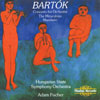Bartók Ballet & Orchestral Music
View record and artist detailsRecord and Artist Details
Composer or Director: Béla Bartók
Genre:
Orchestral
Label: Nimbus
Magazine Review Date: 6/1990
Media Format: CD or Download
Media Runtime: 64
Mastering:
Stereo
DDD
Catalogue Number: NI5229

Tracks:
| Composition | Artist Credit |
|---|---|
| (The) Miraculous Mandarin |
Béla Bartók, Composer
Adám Fischer, Conductor Béla Bartók, Composer Hungarian State Symphony Orchestra |
| Concerto for Orchestra |
Béla Bartók, Composer
Adám Fischer, Conductor Béla Bartók, Composer Hungarian State Symphony Orchestra |
Composer or Director: Béla Bartók
Label: Classics
Magazine Review Date: 6/1990
Media Format: CD or Download
Media Runtime: 67
Mastering:
DDD
Catalogue Number: 791106-2

Tracks:
| Composition | Artist Credit |
|---|---|
| Concerto for Orchestra |
Béla Bartók, Composer
Béla Bartók, Composer Hiroyuki Iwaki, Conductor Melbourne Symphony Orchestra |
Composer or Director: Béla Bartók
Label: Nimbus
Magazine Review Date: 6/1990
Media Format: Cassette
Media Runtime: 0
Mastering:
Stereo
DDD
Catalogue Number: NC5229

Tracks:
| Composition | Artist Credit |
|---|---|
| (The) Miraculous Mandarin |
Béla Bartók, Composer
Adám Fischer, Conductor Béla Bartók, Composer Hungarian State Symphony Orchestra |
| Concerto for Orchestra |
Béla Bartók, Composer
Adám Fischer, Conductor Béla Bartók, Composer Hungarian State Symphony Orchestra |
Composer or Director: Béla Bartók
Label: Classics
Magazine Review Date: 6/1990
Media Format: Cassette
Media Runtime: 0
Mastering:
DDD
Catalogue Number: 791106-4

Tracks:
| Composition | Artist Credit |
|---|---|
| Concerto for Orchestra |
Béla Bartók, Composer
Béla Bartók, Composer Hiroyuki Iwaki, Conductor Melbourne Symphony Orchestra |
Author: Edward Seckerson
Hardly a bar goes by that isn't moulded, as it were, in Fischer's own image. To my mind he actually impedes and inhibits the natural fire and impetus of Bartok's sturdy allegros (both first and last movements struck me as over-reined in this respect; he certainly doesn't make life easy for his players) while the added relaxation he affords us in all the lyric diversions is invariably marred by excessive (indeed sometimes ham-fisted) rubato. Take, for instance, the lovely ''Intermezzo'' theme, returning undaunted and oblivious after being given the proverbial raspberry: Bartok ensures that it is lovelier and more serene than before by muting his strings and marking piano in contrast to the previous forte. Fischer selfconsciously underlines that contrast in precious pianissimo and one horribly mannered turn of phrase, mid-way through the tune. This, alas, is all too indicative. Yet, rather too much character than no character at all, as we'll see shortly with reference to the Mehta performance. If only Fischer could have curbed his excesses and concentrated more on context than effect, then passages like the evocative brass chorale trio of the ''couples'' movement (given here with gorgeously nostalgic horns) or the extraordinary 'reconstitution' of texture, pre-coda in the finale (stranger than I've ever heard it) would have made far more impact.
Impact is not lacking in the accompanying Miraculous Mandarin, though Fischer's opening cityscape is really too emphatic, too literal, to be truly alarming. Where he does score, as ever, is on atmosphere, the first of the enticing clarinet solos emerging from some seedy back alley through a shudder of string tremolando—space, isolation and menace conspiring to chilling effect. Again, though, why the need to paw so over already explicit phrases: the momentous entrance of the Mandarin (and incidentally, I don't hear the pentatonic trombones clearly in the preceding build-up) is grotesquely miscalculated—elastically rhetorical with almost comic trombone
Much of that feeling has of course to do with Mehta in his slick but uneventful Sony Classical disc. Beautifully presented, one might say, but what about the content? His Concerto is very much the out-and-out showpiece, superbly delivered, but under-characterized. One begins to wonder if the woodwinds are not perhaps too cultivated, something of a fashion parade in their two-by-two games. And whatever happened to the ''Elegia's'' outrage (the opening pages are seductive, almost soothing in their plush texturing) or the finale's life-asserting Magyar spirit? The neo-baroque fugue here is frightfully civilized, a very long way indeed from Bartok's grass-roots. Which all goes to show that an abundance of style and fabulous sonority from one of the world's great orchestras simply isn't enough. Mehta's Mandarin is never dangerous. Not one note is misplaced, nowhere can one fault his pacing or sense of balance, but where is the anxiety, the ugliness, and above all the decadence, of this sordid little scenario? I should point out that Sony Classical adopt a markedly different sound picture for each of the scores. The Mandarin (Jesus-Christus Kirche) is the more immediate, the more obviously 'engineered' with detail like piano and percussion peaking rather unnaturally; the Concerto (Philharmonie) is more 'open' (strings a touch too recessed for my taste, timpani unconvincing in perspective). By the way, it is a pity that no one appears to have spotted the cut-reverberation at the end of the first movement of the Concerto?
Which leaves the Virgin Classics release, offering at least one major advantage over the others in the shape of a complete
Discover the world's largest classical music catalogue with Presto Music.

Gramophone Digital Club
- Digital Edition
- Digital Archive
- Reviews Database
- Full website access
From £8.75 / month
Subscribe
Gramophone Full Club
- Print Edition
- Digital Edition
- Digital Archive
- Reviews Database
- Full website access
From £11.00 / month
Subscribe
If you are a library, university or other organisation that would be interested in an institutional subscription to Gramophone please click here for further information.





